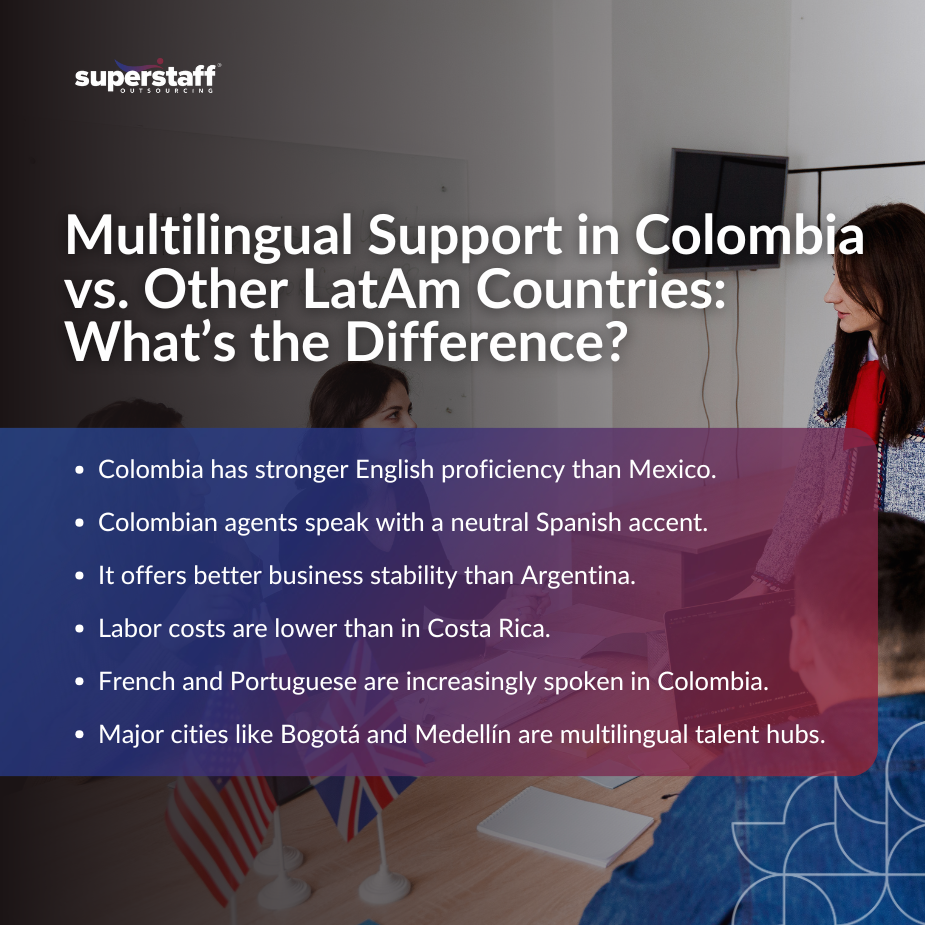
In today’s hyperconnected marketplace, multilingual support is no longer a “nice to have”—it’s a non-negotiable. Customers expect service in their native language, and businesses that can’t meet that expectation risk losing loyalty, revenue, and relevance. Whether it’s handling tech queries in English, delivering e-commerce support in Spanish, or managing healthcare inquiries in Portuguese or French, the demand for multilingual customer experience (CX) is reshaping global outsourcing strategies.
Enter Latin America—a region rapidly gaining traction as a multilingual CX powerhouse. With cultural proximity to North America, strong language education, and time zone alignment, LATAM countries have become top contenders for companies looking to scale support across borders. Among them, Colombia has emerged as a standout. But as more businesses look to outsource to the region, one question keeps coming up: How does Colombia’s multilingual support stack up against other LATAM hotspots like Mexico, Argentina, and Costa Rica?
In this blog, we’ll explore the strengths and limitations of Colombia’s multilingual capabilities in the context of the broader region. You’ll walk away with a clearer understanding of which market best aligns with your CX goals and why outsourcing in Spanish, French, Portuguese, or English to the right LATAM country could transform your customer relationships.
Why Multilingual Support Is a Priority for Global Brands
As businesses scale globally, multilingual support directly impacts customer satisfaction, loyalty, and market penetration. Language is often the first barrier—or bridge—between your brand and the customer. Delivering support in a customer’s preferred language not only increases resolution speed but builds emotional trust.
Today’s customer experience landscape has shifted. Support isn’t just reactive—it’s proactive, omnichannel, and instantaneous. That shift has made multilingual live chat, real-time messaging, and seamless cross-language transitions essential.
In North America and Europe, Spanish is among the most widely spoken second languages, followed closely by Portuguese and French. For global brands, this multilingual capability directly correlates with growth. Customers expect native-level fluency, not awkward scripts. They expect context, not just translation. They expect 24/7 availability, with agents who understand cultural nuance and local behaviors.
Outsourcing multilingual customer support to regions like Latin America enables companies to deliver on those expectations while maintaining efficiency and cost control.
With multilingual support now essential, let’s explore how a BPO in Colombia compares with its regional neighbors in meeting these rising expectations.
Colombia’s Language Capabilities and CX Talent Pool
Colombia stands out for its strong English proficiency and growing pool of multilingual professionals. In EF’s English Proficiency Index, Colombia continues to rise, outperforming many neighboring countries, especially in major business hubs like Bogotá and Medellín. These cities are not only multilingual centers—they’re innovation ecosystems with universities, training programs, and tech-forward infrastructure.
The country’s language capabilities don’t stop at English. French and Portuguese are increasingly common among the workforce, thanks to regional partnerships and educational reforms. Add to this a neutral Spanish accent—one of the most “understood” across the Spanish-speaking world—and Colombia becomes a clear favorite for brands needing pan-regional CX.
The government has prioritized language and customer experience training, partnering with private BPOs to upskill the workforce. These efforts have resulted in a steady pipeline of young, tech-savvy professionals entering the industry.
From digital banks to e-commerce platforms, global brands are already investing in multilingual customer service quality in Colombia vs LATAM competitors—and seeing real results.
But how does this talent compare with the offerings in other LATAM countries?

Mexico: Proximity and Volume, but Mixed Language Quality
Mexico offers geographical convenience and scale but faces challenges in consistent English fluency. Its proximity to the United States makes it an obvious choice for nearshoring. With a large population and well-established BPO sector, Mexico can handle volume-based work and short turnaround times effectively.
Spanish-language support in Mexico is robust, and the country has experience serving both North American and Latin American customers. However, when it comes to consistent English proficiency, Mexico ranks lower than Colombia, especially outside of border cities and major metros.
While Mexico is a solid choice for outsourcing in Spanish, its heavier regional accents and variability in English fluency may pose a barrier for brands focused on premium multilingual CX. In terms of customer perception, this can lead to friction and missed opportunities.
Mexico excels in scale and response speed but may fall short on language neutrality and CX polish—factors increasingly important in competitive markets.
Next, we examine Argentina, known for its high fluency levels and academic strengths, but facing different challenges altogether.
Argentina: High Fluency, but Economic Instability as a Risk
Argentina boasts a highly educated, multilingual workforce—but with caveats around business continuity. The country has long been known for its cultural proximity to Europe. English proficiency in Argentina is among the highest in Latin America, and many workers are fluent in French and Italian due to heritage and educational influence.
Argentina’s time zone alignment with the U.S. East Coast adds convenience for CX operations. For brands needing complex support or technical back-office functions, Argentina offers elite talent—especially in sectors like finance, legal, and software.
However, the challenge lies in operational stability. Frequent currency fluctuations, inflation, and labor strikes create unpredictability. Wage volatility makes long-term contracts difficult to budget.
If you’re a company that prioritizes multilingual support in high-skill functions and can tolerate risk, Argentina may be viable. But for scalable, steady CX operations, many companies are now favoring Colombia’s more stable climate.
Let’s look at Costa Rica—a country with premium appeal but a higher entry point.
Costa Rica: Premium Services, Higher Price Tag
Costa Rica delivers high-quality CX and multilingual support, but at a higher cost. It has a longstanding reputation as a BPO destination, especially in healthcare, tech, and financial services. The country’s political stability, high education standards, and bilingual workforce have made it a favorite for North American companies.
English fluency is widespread, particularly in the capital, San José. Many agents are also proficient in German, French, and Portuguese, making Costa Rica ideal for European-facing campaigns.
However, Costa Rica’s labor pool is smaller than Colombia’s or Mexico’s, which limits scalability. Wage rates and operational costs are also significantly higher. For small to mid-market firms, this can be a barrier to entry.
If your brand is pursuing a boutique or premium service model and cost is secondary to quality, Costa Rica is worth exploring. But for companies that need scale without sacrificing multilingual quality, BPO in Colombia may provide a better balance.
Now that we’ve covered regional comparisons, let’s revisit what makes Colombia the top contender in this growing market.
Colombia’s Competitive Edge in the LATAM CX Landscape
Colombia offers the best blend of language skill, cost-effectiveness, and cultural alignment for multilingual outsourcing. It checks all the boxes that global businesses look for when evaluating a support location: talent, scalability, affordability, and market readiness.
English proficiency in Colombia is strong and improving consistently across major cities. Thanks to accent neutrality and cultural alignment with both North America and Europe, Colombian agents are ideal for voice-based support and nuanced conversations. Their Spanish is considered clear and easy to understand, even for non-native speakers—an advantage that enhances customer satisfaction.
Wages in Colombia remain lower than in Costa Rica or Argentina, while maintaining higher quality standards than much of Mexico. The Colombian government’s active support for BPO investment—through training programs, tax incentives, and infrastructure development—has also made it easier for international companies to launch operations.
Colombia also boasts mature infrastructure in IT, telecom, and back-office services. Whether you need inbound customer support, technical help desks, or omnichannel delivery, the talent and systems are already in place.
In short, when it comes to multilingual customer service quality in Colombia vs LATAM countries, Colombia continues to lead.
How to Choose the Right LATAM Market for Your Needs
Choosing between Colombia and other LATAM nations depends on your business goals, risk tolerance, and CX priorities. There’s no one-size-fits-all answer—but understanding your needs can help you choose the right outsourcing destination.
Start by identifying your primary service languages. If you need Spanish-first support with scalable volume, Mexico might suffice. If your CX strategy involves complex, high-skill conversations in English or French, Argentina is worth considering—though not without financial risk. For luxury or premium segments, Costa Rica may be ideal if budget isn’t a constraint.
However, if you’re looking for a partner that offers language neutrality, scalability, cost-efficiency, and long-term viability, Colombia brings all the advantages together. It is particularly well-suited for companies pursuing outsourcing in Spanish with additional language needs like Portuguese or English.
Ultimately, choosing the right BPO partner is about more than location—it’s about finding a team that aligns with your brand voice, growth goals, and service expectations. And that’s where Colombia continues to deliver.
Why Colombia Is the Smart Choice for Multilingual Support
Colombia continues to lead among LATAM countries in delivering cost-effective, high-quality multilingual support. From startup-friendly talent pipelines to enterprise-grade infrastructure, Colombia is shaping the future of CX in the Americas.
If you’re ready to expand your multilingual support across borders, now is the time to make a move.
Partner with SuperStaff and tap into Colombia’s top-tier multilingual talent. Whether you’re supporting customers in Spanish, English, Portuguese, or French, we’ll help you build a CX team that speaks your customers’ language—literally and culturally. Contact us today to explore your options.






